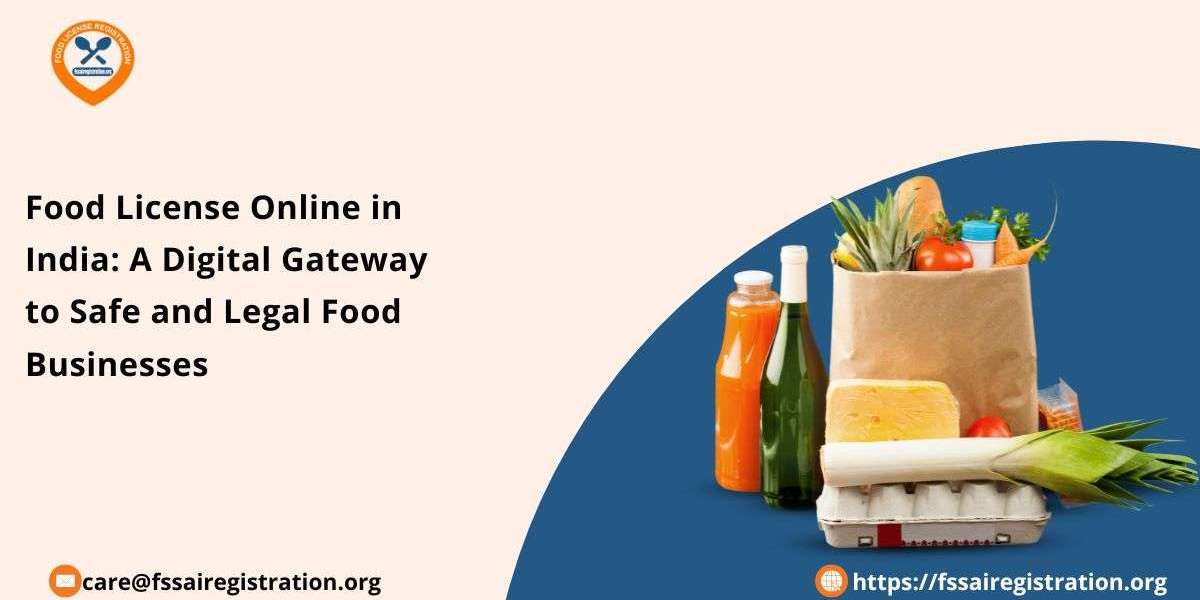Introduction
In a nation like India, where food is both a livelihood and a cultural identity, ensuring food safety has never been more important. Whether you’re a street food vendor, an online cloud kitchen, or a large food processing unit, obtaining a Food License is a legal necessity and a mark of trust.
Thanks to digital transformation, acquiring a Food License Online is now more streamlined, transparent, and accessible than ever before. This article explores how the online food license process benefits entrepreneurs, simplifies regulatory compliance, and promotes a culture of food safety across India.
What is a Food License?
A Food License is an authorization issued by the Food Safety and Standards Authority of India (FSSAI) to food business operators (FBOs). It ensures that the food produced, stored, distributed, or sold complies with safety standards as per the Food Safety and Standards Act, 2006.
Each license comes with a 14-digit FSSAI number, which must be displayed on food packages and premises.
Why is a Food License Important for Food Businesses?
- Legal Compliance: Operating without a food license is a punishable offense under Indian law. It's mandatory for all types of food-related businesses.
- Consumer Assurance: Displaying the license builds credibility and trust among customers.
- Business Expansion: Retail chains, delivery platforms, and exporters require FSSAI licensing to collaborate.
- Avoid Penalties: Non-licensed businesses risk fines up to ₹5 lakhs or even imprisonment.
- Public Health Protection: Ensures food hygiene and safety, reducing foodborne diseases.
Who Needs a Food License?
Almost every business that deals with food must have a food license, such as:
- Food manufacturers and processors
- Street food vendors and hawkers
- Restaurants, cafes, and dhabas
- Online food delivery kitchens and aggregators (e.g., Zomato, Swiggy vendors)
- Food transporters and storage facilities
- Exporters and importers of food products
- Food wholesalers and retailers
- Food packaging units
Even small vendors need at least a Basic FSSAI Registration.
Types of Food Licenses in India
Based on the scale and nature of the business, there are three major types:
1. Basic FSSAI Registration
- For petty food businesses with an annual turnover below ₹12 lakh
- Ideal for local shops, vendors, or home-based food sellers
2. State FSSAI License
- For businesses with annual turnover between ₹12 lakh and ₹20 crore
- Applies to medium-scale manufacturers, storage units, and transporters
3. Central FSSAI License
- For businesses with an annual turnover above ₹20 crore
- Required by large food processors, importers/exporters, and government agencies
Advantages of Applying for a Food License Online
India’s FSSAI has digitized the application process, making it easier for businesses across rural and urban areas alike.
Time-Efficient
- No need to visit government offices multiple times.
- Applications can be filed from anywhere.
Transparency
- Real-time tracking of the application status.
- Clear guidelines and documentation checklists.
Ease of Document Submission
- Digital uploads eliminate paperwork and courier delays.
Eco-Friendly
- A completely paperless initiative aligned with Digital India.
How to Apply for a Food License Online
Here’s a step-by-step guide:
- Visit the FSSAI Website: Go to the official FSSAI registration portal online.
- Fill in Basic Details: Enter your personal and business details—like your name, phone number, email, business name, type of food you deal with, business type, and full address.
- Upload Your PAN Card: Add a scanned copy or photo of your PAN card as part of the application.
- Double-Check and Submit: Review all your information to ensure it’s correct, then click the "Submit" button.
- Pay the Registration Fee: Pay the applicable fees online using UPI, debit/credit card, or net banking. The fee depends on your license category.
- OTP Verification Call: Our team will call you to verify your mobile number or email using a one-time password (OTP).
- Inspection (If Needed): In some cases, FSSAI officers may visit your premises for a quick inspection.
- Get Your License: Once everything is approved, your FSSAI license will be available for download from the official website.
Food License Number Format Explained
Every food license comes with a 14-digit number:
- First digit: Indicates license status
- Next 2 digits: State code
- Next 2 digits: Year of issue
- Next 7 digits: Unique registration number
- Last 2 digits: Check digits
This number must be printed on:
- Food packages
- Menus
- Delivery boxes
- Premises walls
Common Mistakes to Avoid in Online Food License Application
- Incorrect business type selection – Choose accurately between registration and license.
- Mismatch in documents – Ensure name/address matches across documents.
- Non-specific product categories – Mention specific food types (e.g., bakery, dairy).
- Expired documents – Upload recent and valid documents only.
- Missing renewal deadline – Use a calendar alert or a professional service for reminders.
Compliance After Receiving a Food License
- Display the license visibly at your premises.
- Follow safety protocols and hygiene standards.
- Use the license number on all branding and packaging.
- Maintain audit and inspection records.
- Update FSSAI on any business changes (address, product, etc.).
Why Food License is a Game-Changer for Digital Kitchens and Startups
With the surge in food delivery platforms, cloud kitchens, and food startups, the food license:
- Enables listing on Swiggy, Zomato, and Amazon Food
- Builds investor confidence
- Helps collaborate with aggregators
- Allows seamless onboarding on e-commerce platforms
Role of FSSAI in Digital Food Ecosystem
FSSAI continues to improve the online food licensing ecosystem by:
- Introducing mobile apps for license management
- Integrating with GST and MSME databases
- Promoting e-inspection and video audits
- Encouraging AI-driven compliance checks
Note:- Now you can easily Renewal food license
Conclusion
The Food License Online system is a milestone in simplifying regulatory compliance for Indian food businesses. It ensures that even the smallest food vendor has access to legal authorization and consumer trust. With a transparent, digital-first approach, FSSAI is empowering India’s food sector to operate safely, ethically, and profitably.
For food entrepreneurs and established businesses alike, getting your FSSAI Food License online isn’t just a legal requirement—it’s a strategic move toward brand trust, market access, and sustainable growth.



